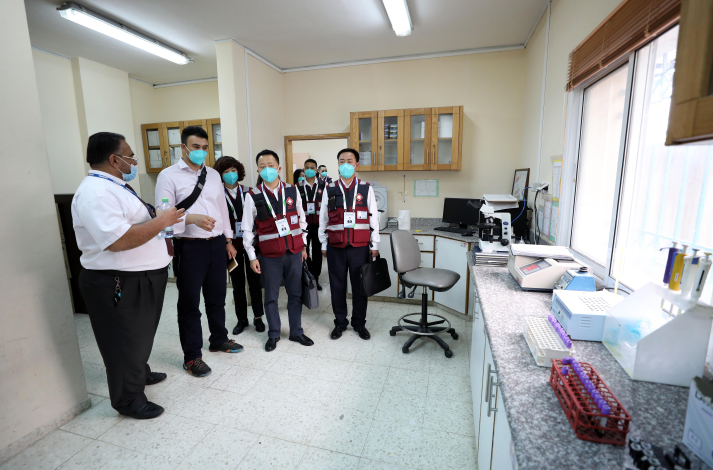| World |
| China remains committed to multilateralism for global peace and development | |
|
|
 Chinese COVID-19 control experts visit a clinic run by the UN Relief and Works Agency for Palestine Refugees in the Near East in Ramallah on June 15 (XINHUA)
 The United Nations has had a bumpy ride over the past three quarters of a century. With both advantages and limitations, no one can deny that the UN has evolved into the most representative, authoritative and full-fledged cooperation platform that is the centerpiece of global governance and the international system. The United Nations has had a bumpy ride over the past three quarters of a century. With both advantages and limitations, no one can deny that the UN has evolved into the most representative, authoritative and full-fledged cooperation platform that is the centerpiece of global governance and the international system.It has made indelible contributions to maintaining world peace and promoting sustainable development and made possible the wide acceptance of a people-centered philosophy, and a broad consensus on the need for mutually beneficial cooperation. It has driven home that in an era of intertwined traditional and non-traditional security threats with interconnected interests of all countries, the world is increasingly an indivisible community with a shared future. Building a stronger UN Now the world has seen profound shifts, accentuated by the enormous impact of the novel coronavirus disease (COVID-19) pandemic. Economic globalization faces unprecedented headwinds. Protectionism and bullying are resurging. Deficits in governance, trust, peace and development are widening. International rules and multilateral mechanisms are under attack, and the international landscape is filled with uncertainties and destabilizing factors. The road to common prosperity remains tortuous. That said, we must recognize that peace and development are the prevailing trend of our times. Globalization and multi-polarization are moving forward despite twists and turns, a new round of scientific and technological revolution and industrial transformation is gathering momentum. To build a stronger UN, it is crucial to adhere to multilateralism. The contemporary international order, which is based on the purposes and principles of the UN Charter, is virtually made possible by the vision and practice of multilateralism. To uphold multilateralism in the new era, the following principles need to be followed: Adhering to international law and universally recognized norms governing international relations. Practicing multilateralism is, first and foremost, about upholding the UN Charter. Past experience shows that adherence to the charter brings tranquility. When its principles were flouted, put aside or applied selectively, the results were catastrophic: conflict, chaos, death, disillusion and mistrust. At a time when the world is wrestling with the COVID-19 pandemic, rising geopolitical tensions and growing climate disruption, the charter points the way to the solidarity we need today and across generations. Our shared challenge is to do far better in upholding the charter's values and principles, adhering to the framework that has kept us together. State-to-state relations, therefore, should observe the purposes and principles of the UN Charter, honor agreements, and be based on credibility, not impulse or willful revocation of commitments. China opposes any acts of arbitrary distortion of international law. A selective or utilitarian approach, which smacks of hegemony, can never be accepted. Bullying tactics like long-arm jurisdiction and unilateral sanctions are rejected. Promoting peace and development. No matter what approach they take, all acts of multilateralism should lead, as their ultimate objective, to the promotion of world peace and development. If the West enjoys prosperity and progress while the rest are mired in backwardness, multilateralism can never be truly implemented and the common progress of humanity would never be possible. In a globalized era, the circle of development beneficiaries will be extended. Only when more countries get to develop can the international community be empowered and there be more partners in our joint response to challenges. China respects the choices of Western countries, and will draw on the experience of developed countries to work for shared prosperity. The West also needs to eschew its subconscious belief in the superiority of its civilization, and abandon its prejudices and anxieties against China. It needs to respect the choices of the Chinese people, and accept the growth of a major country in the East, for China's development and rejuvenation is an important part of human progress and embodies the colorful diversity brought by multilateralism. Living up to the overarching principles of fairness, justice and win-win cooperation. Equality and mutual respect are important tenets of multilateralism. We must abandon ideological prejudices and the outdated Cold War mentality, respect other countries' choice of development paths, and oppose imposing one's own values on others. As artificial intelligence, 5G, bio-tech and other advanced technologies shape the development of the global economy, countries are duty-bound to provide a fair, equitable and non-discriminatory environment for foreign businesses to invest, operate and pursue cooperation. The new round of scientific and technological revolution should provide fresh driving force for common development and better opportunity shared by all countries. We need to encourage innovation cooperation to foster new drivers of growth, reject technological monopoly, digital hegemony, and the attempt to create technological divide. We must resolutely fight against any self-claimed supremacy, abuse of national power to suppress innovative enterprises from other countries, interference in business operations and the distortion of the global market. We must work to create a fair, just, and non-discriminatory environment for international scientific and technological cooperation and enterprise innovation. Acting to deliver real results. Multilateralism is not about making empty rhetoric. It must be pursued to solve problems. Efforts must be targeted, results-oriented, and measured by visible progress. It is imperative that we work together to uphold the international system with the UN at its core as well as the multilateral trading system centering on the World Trade Organization (WTO). Beneath states and nations, ideas and languages, lies the fate of individual human beings in need. Success in tackling challenges not only lies in diplomacy, but also comes from the empathy and responsibility we feel toward people in need. China's role The People's Republic of China has been upholding the international order and multilateralism. Though once kept out of the UN for 22 years, it has never wavered in its commitment to multilateralism and the UN Charter. It stayed true to its commitment throughout the negotiation process on its return to the General Agreement on Tariffs and Trade and then accession to the WTO, negotiations that lasted 15 long years and were concluded at a certain price. It fulfilled its promise and integrated itself into the world economic system. After the international financial crisis broke out, China chose not to stand by idly but to work together with other countries to tide over rough times. For years, China has contributed over 30 percent of global growth. It has played its part in helping restore global recovery. China has all along been a promoter of world peace, injecting positive energy into the evolving international architecture. It has been a defender of the international order, bringing stability to the global governance system, and a facilitator of globalization, making major contributions to building an open world. China has all along been a contributor to world development, providing sustained driving force for global growth. In the new context, China will continue to shoulder its responsibilities and make its contribution as a major country, provide more global public goods and play its part to promote world peace and development. The author is a Counselor of the Ministry of Foreign Affairs, China (Print Edition Title: The Golden Key) Copyedited by Sudeshna Sarkar Comments to yanwei@bjreview.com |
|
||||||||||||||||||||||||||||||
|